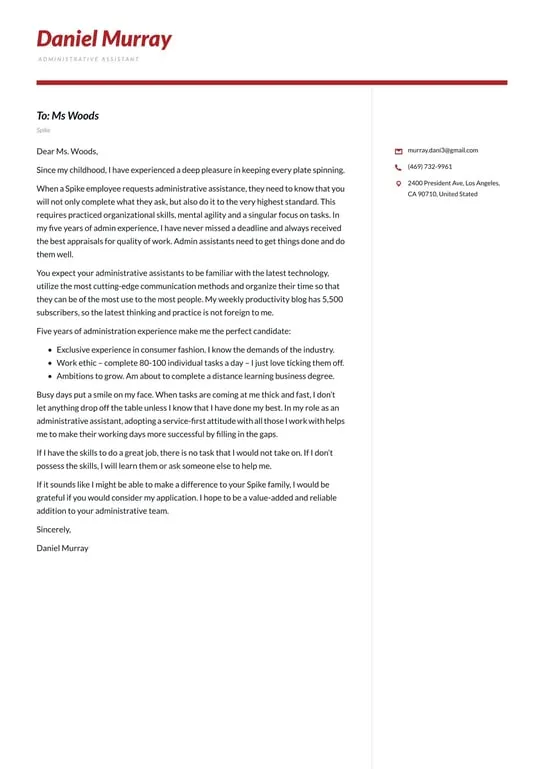Why a Great Cover Letter Matters for Admin Assistants
In the competitive landscape of administrative assistant positions, a well-crafted cover letter can be the key to unlocking your dream job. It’s your first opportunity to make a lasting impression on a potential employer, going beyond the basic details of your resume. A strong cover letter isn’t just a formality; it’s a powerful tool that allows you to showcase your personality, enthusiasm, and unique qualifications in a way a resume alone cannot. Administrative assistant roles often involve a high degree of interpersonal interaction and require individuals who are organized, detail-oriented, and proactive. Your cover letter is where you demonstrate these qualities before you even get to the interview stage. It’s your chance to prove that you are not just qualified, but the perfect fit for the company culture and the specific requirements of the role. A compelling cover letter can significantly increase your chances of getting noticed and securing an interview, ultimately leading to your career advancement.
Highlighting Your Skills and Experience
Your cover letter should serve as a spotlight, illuminating your most relevant skills and experiences. This isn’t just about listing your past job duties; it’s about connecting your skills with the specific needs of the administrative assistant role. Think strategically about what the employer is looking for. Review the job description meticulously and identify the key requirements and desired attributes. Then, in your cover letter, provide concrete examples of how you’ve demonstrated these skills in previous roles. Quantify your achievements whenever possible. Instead of saying, ‘Managed office correspondence,’ try ‘Managed all incoming and outgoing correspondence, resulting in a 15% reduction in response time.’ Highlighting your achievements in this way demonstrates your value and impact in previous positions. The most successful cover letters are those that clearly articulate how your skills and experience align with the employer’s needs, making it easy for them to see you as a solution to their administrative challenges.
Key Skills to Showcase
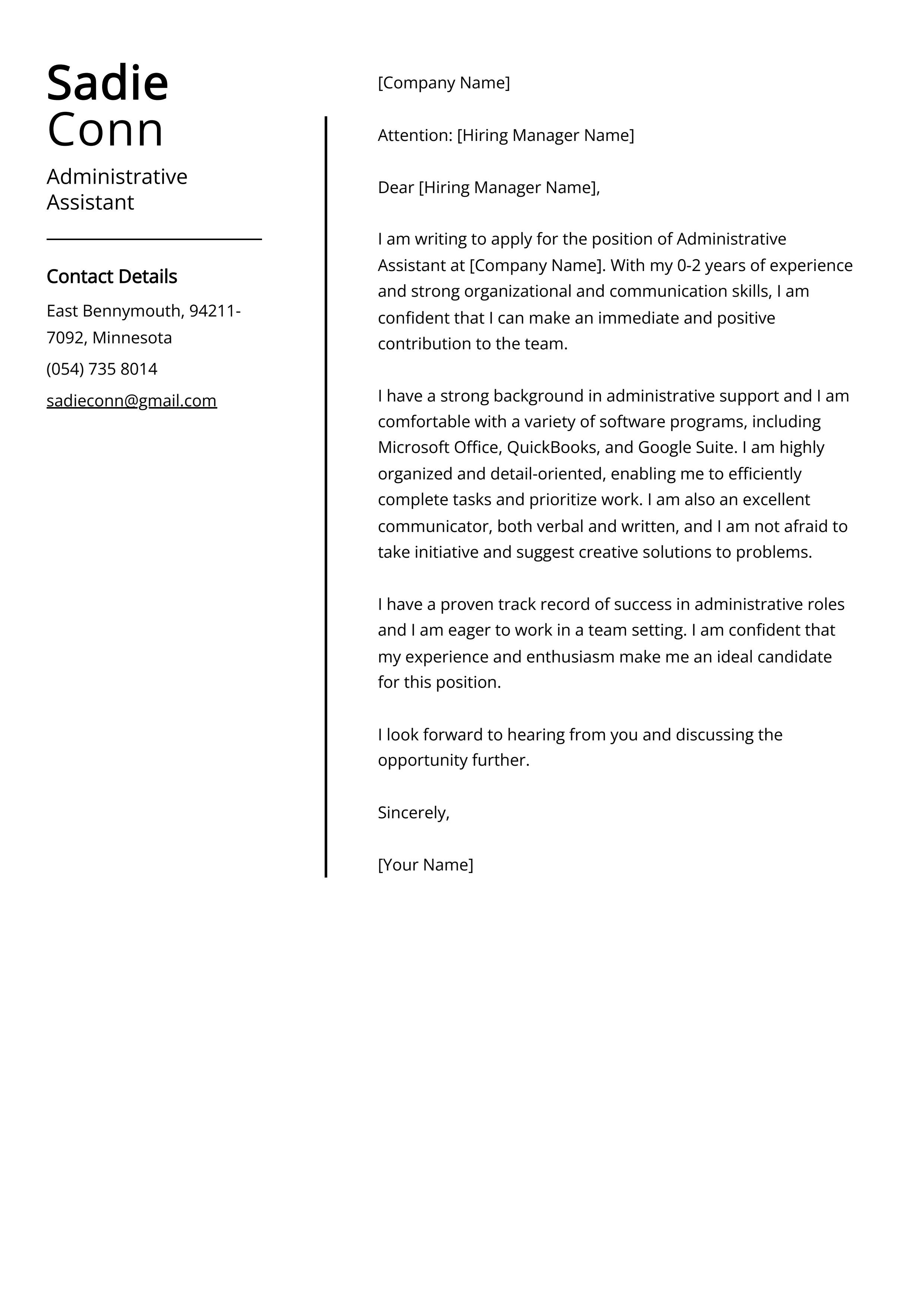
Administrative assistant roles require a diverse skill set. Make sure to highlight the following skills. Communication skills are critical, including both written and verbal communication. Demonstrate your ability to write clear, concise emails, reports, and other documents. Organizational skills are a must, so highlight your ability to manage multiple tasks, prioritize deadlines, and maintain meticulous records. Proficiency in relevant software and technologies like Microsoft Office Suite (Word, Excel, PowerPoint, Outlook) is important. Customer service skills are valuable, so you should mention how you interact with visitors, and handle phone calls. Include your ability to solve problems, manage your time, and demonstrate initiative.
Formatting Your Cover Letter
A well-formatted cover letter is easy to read, professional, and reflects your attention to detail. Choose a clean and professional font, such as Times New Roman, Arial, or Calibri, with a font size between 10 and 12 points. Use single spacing within paragraphs and double spacing between paragraphs to make the text visually appealing. Maintain consistent margins (typically 1 inch on all sides) to avoid a cluttered appearance. Break up large blocks of text into shorter, digestible paragraphs. A cover letter that is easy on the eyes is more likely to be read thoroughly. Consistency in formatting enhances readability and projects a sense of professionalism. Using bullet points to list key accomplishments or skills can further improve readability and emphasize important information, making it easy for the reader to quickly grasp your qualifications.
Choosing the Right Format
Select a cover letter format that highlights your strengths and aligns with the job requirements. The most common formats include the standard format, the skills-based format, and the combination format. The standard format is suitable if your experience directly matches the job requirements. It follows a traditional structure and emphasizes your work history. A skills-based format, suitable if you are changing careers or have gaps in your employment history, or if the job focuses on a particular skill set, it focuses on showcasing your skills and abilities. The combination format blends elements of both the standard and skills-based formats, highlighting both your skills and experience. Tailor your chosen format to the specific administrative assistant role and the company’s culture.
Tailoring Your Cover Letter
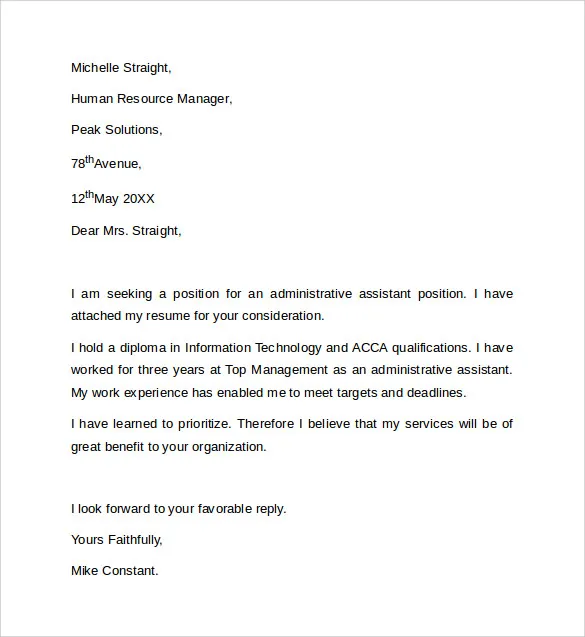
Generic cover letters are easily detected and often discarded. To stand out, customize your cover letter for each application, demonstrating genuine interest and suitability for the specific role and company. Begin by carefully reviewing the job description, identifying the essential skills, qualifications, and responsibilities. Then, tailor your letter to directly address these requirements. Use the language from the job description to showcase your relevant skills and experience, making a clear connection between what the employer is seeking and what you offer. Avoid simply restating your resume; instead, provide compelling examples and anecdotes that highlight your achievements and contributions in past roles. Tailoring your cover letter not only increases your chances of being selected for an interview but also showcases your attention to detail and proactive approach, which are highly valued in administrative assistant roles.
Researching the Company
Before writing your cover letter, conduct thorough research on the company. This will help you tailor your letter to align with the company’s values, mission, and culture. Visit the company’s website to learn about its products or services, its history, and its recent news. Explore their social media profiles, such as LinkedIn, Facebook, and Twitter, to get insights into their company culture and values. Look for any press releases, news articles, or blog posts that highlight the company’s achievements, goals, and current projects. Understanding the company’s specific needs and challenges will enable you to articulate how your skills and experience can contribute to their success. Make sure to address a specific person, or if not, search on LinkedIn the possible hiring manager.
Using Keywords Effectively
Incorporating relevant keywords from the job description is a crucial step in ensuring your cover letter gets noticed. Applicant Tracking Systems (ATS), used by many companies to screen resumes and cover letters, often scan for specific keywords. By including these keywords in your cover letter, you increase the likelihood that your application will pass through the initial screening process. Analyze the job description and identify the key skills, qualifications, and responsibilities mentioned. Then, strategically integrate these keywords into your cover letter, using them naturally within your sentences. However, avoid keyword stuffing, which can make your cover letter sound unnatural and less appealing. Instead, focus on using keywords in context, demonstrating your understanding of the role and how your skills align with the company’s needs. Keywords should be incorporated throughout your letter, including your opening, body paragraphs, and closing, to make sure you communicate the most important information.
Structuring Your Cover Letter
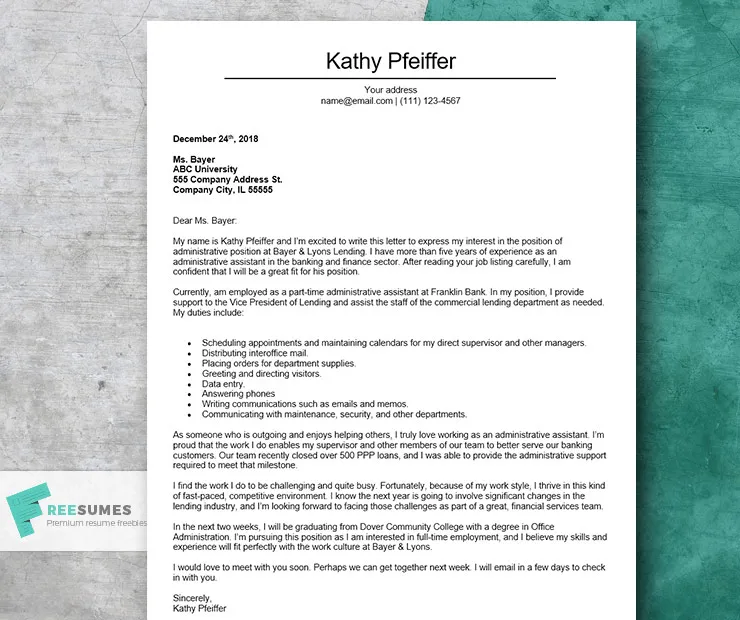
The structure of your cover letter is key to conveying your message effectively. It typically consists of an opening paragraph, body paragraphs, and a closing paragraph. Each part of the structure has a unique purpose. The opening should grab the reader’s attention and state your interest in the position. The body paragraphs should showcase your skills and experience. The closing paragraph should reiterate your interest and provide a call to action.
The Opening Paragraph
Your opening paragraph is your first opportunity to make a positive impression, so it needs to be concise and engaging. Start by addressing the hiring manager by name if possible. Immediately state the position you are applying for and how you learned about the opportunity. Show genuine enthusiasm for the role and the company. You should also include a brief statement about why you are a good fit for the position. Use this opening to grab their attention and express a positive tone, setting the stage for the rest of your letter. This initial paragraph should be compelling enough to encourage the reader to continue, so it is very important.
The Body Paragraphs
The body paragraphs are the core of your cover letter, where you provide details about your skills, experience, and accomplishments. Use these paragraphs to showcase how your qualifications align with the job requirements. Support your claims with specific examples from your past roles, quantifying your achievements whenever possible. For each skill or experience you highlight, provide context and explain the impact you had in your previous roles. This is the perfect place to showcase your skills, using the language of the job description. Keep the tone of your body paragraphs professional, enthusiastic, and results-oriented. Emphasize how your experience will benefit the company and contribute to their success. It’s crucial to balance storytelling with data and to show the employer what makes you unique.
The Closing Paragraph
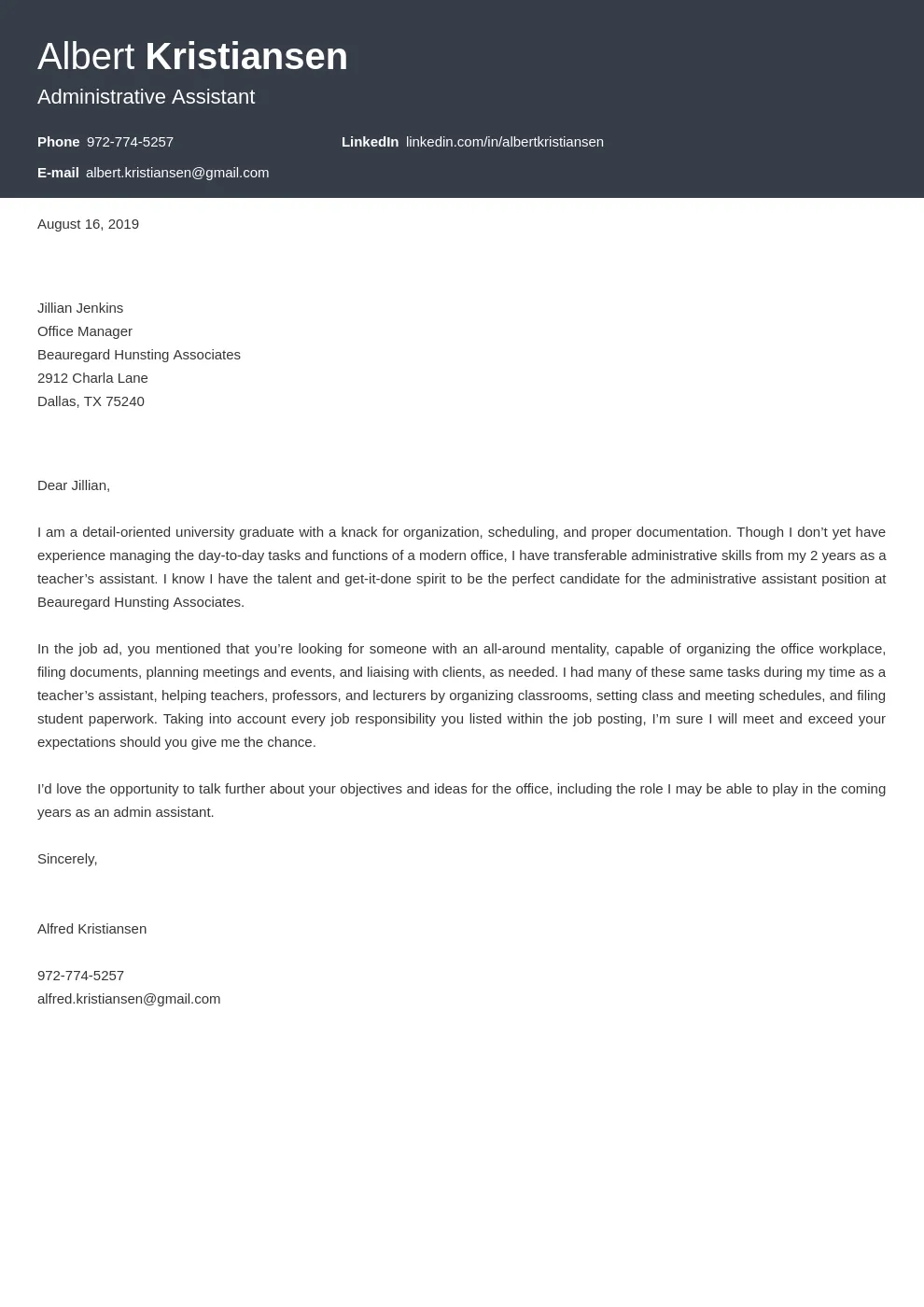
Your closing paragraph should reiterate your interest in the position and express your enthusiasm for the opportunity. Thank the hiring manager for their time and consideration. Include a call to action, such as stating that you are available for an interview and eager to discuss your qualifications further. Provide your contact information, including your phone number and email address, to make it easy for the employer to reach you. Maintain a professional and confident tone. This will help you leave a lasting positive impression. Proofread your cover letter before submitting it to ensure accuracy and professionalism, since it’s the last thing the hiring manager will read.
Proofreading and Editing Your Cover Letter
Proofreading and editing your cover letter are essential steps in ensuring it is free of errors and presents you in the best possible light. Carefully check your cover letter for any grammatical errors, spelling mistakes, and punctuation issues. Pay close attention to sentence structure, ensuring that your writing is clear, concise, and easy to read. Ask a friend, family member, or career advisor to review your cover letter for a second opinion, as a fresh set of eyes can often spot mistakes you might miss. Make sure the formatting is consistent and professional. A polished, error-free cover letter demonstrates your attention to detail, which is a critical skill for administrative assistants.
Common Mistakes to Avoid
Avoiding common mistakes can greatly improve the effectiveness of your cover letter. Don’t use generic templates that lack personalization. Avoid typos and grammatical errors, as they can damage your credibility. Do not exceed one page in length, because hiring managers have a limited amount of time. Refrain from simply restating your resume; instead, use your cover letter to provide additional context and highlight specific achievements. Avoid negative language or excessive use of jargon, as this can make it difficult for the reader to understand your message. Be sure to tailor your cover letter to each specific job application, and avoid any irrelevant information.
Ensuring Clarity and Conciseness
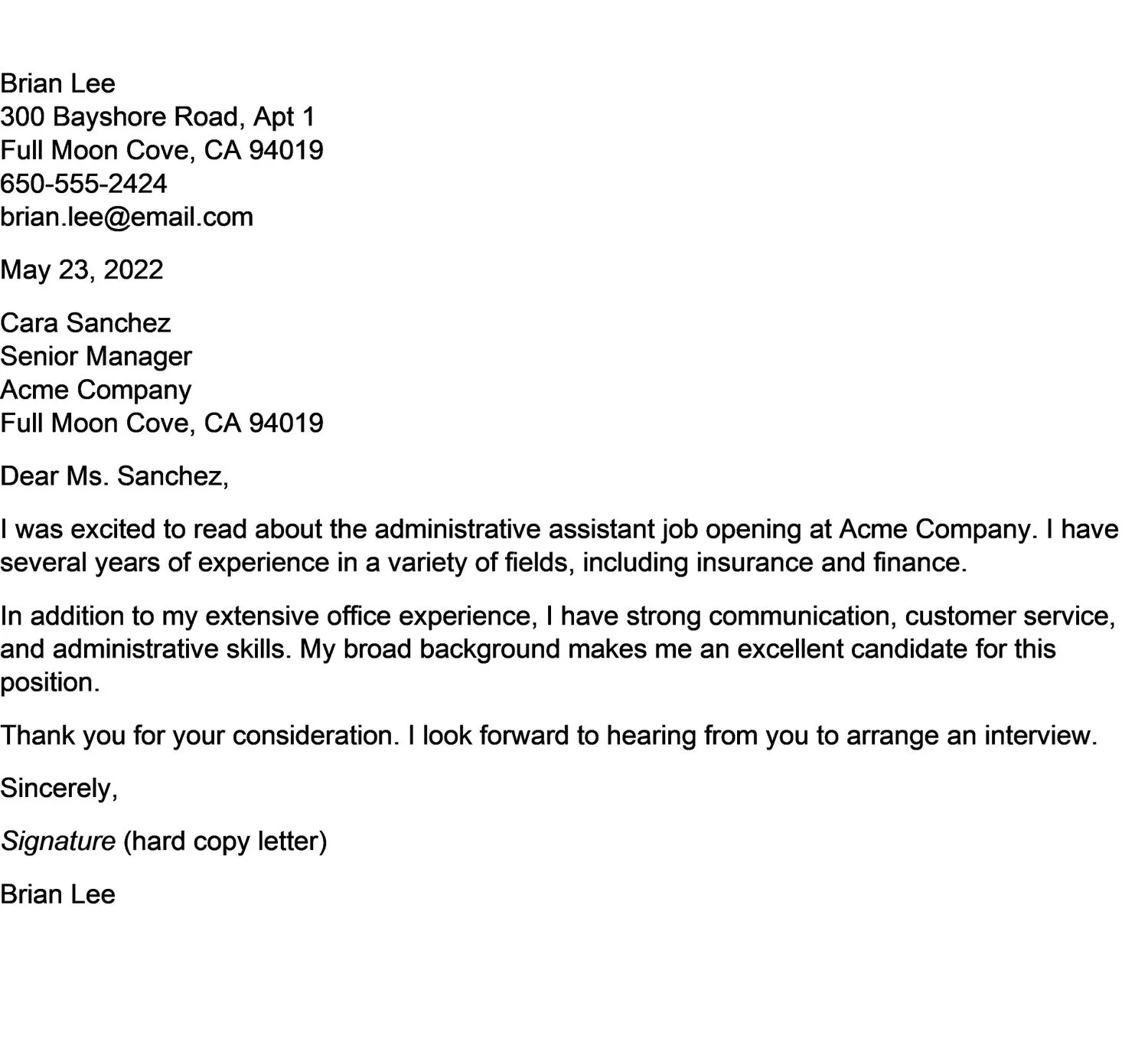
Clarity and conciseness are essential elements of a successful cover letter. Use clear and straightforward language, avoiding jargon or overly complex sentences that may confuse the reader. Write in a concise and direct manner, getting to the point quickly and efficiently. Keep your paragraphs short and focused, each paragraph should have a clear purpose. Use strong action verbs to describe your skills and accomplishments. Proofread carefully to eliminate any unnecessary words or phrases. A well-written cover letter that is clear and concise ensures that your message is easily understood, leaving a positive and professional impression on the hiring manager.
